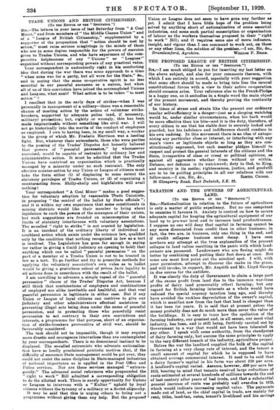TRADE UNIONS AND BRITISH CITIZENSHIP. [To THE EDITOR 01 THE
SPECTATOR."] SIR,—The letters in your issue of last Saturday from " A Coal Miner," and from members of " the Middle Classes Union " and
of a " League of British Citizenship," supplemented by a supporter of the proposition that " action should be met by action," must raise serious misgivings in the minds of those who are in some degree responsible for the powers of coercion given to Trades Unions, and who have experience of the com- parative helplessness of any " Unions" or " Leagues" organized without corresponding powers of any practical value.
Your correspondent is undoubtedly right in his comforting idea that during the war there was some approach to a time " when none was for a party, but all were for the State," &c., and in saying that the same co-operative spirit is no less essential to our peaceful enecesses as a nation, but when all of us of this conviction have joined the contemplated Unions and Leagues, what next? What action is to be taken "to meet action " ?
I recollect that in the early days of strikes—when I was personally in management of a colliery—there was a reasonable chance of meeting action by the action of volunteer strike- breakers, supported by adequate police (and, if necessary, military) protection; but, rightly or wrongly, this has been made impracticable without something like civil war. I will not go historically into the merits of the conduct of employers or employed. I own to having been, in my small way, a worker in the group of which Mr. Frederic Harrison was a leading light. But, whatever their antecedents, those who were parties to the passing of the Trades' Disputes Act honestly believed that powers of " peaceful persuasion," by whomsoever exercised, would be capable of restraint by ordinary law and administrative action. It must be admitted that the Trades Unions have contrived an organization which is practically managed by a minority under no such restraint. The only effective counter-action by any Union or League of citizens must take the form either (1) of displacing to some extent the statutory privileges of Trades Unions, or (2) of organizing a counteracting force. Shitty-shally and highfalutin will avail nothing Your correspondent " A Coal Miner " makes a good sugges-
tion for voluntary adoption by reasonable Trade Unionists, in proposing " the control of the ballot by State officials "; and it is within my own experience that some constituents in mining districts would like their member to bring about legislation to curb the powers of the managers of their unions, but such suggestions are founded on misconception of the limits of statutory interference with voluntary associations. The so-called " right to strike " is not created by legislation. It is an incident of the ordinary liberty of individual or combined action which exists under the common law, qualified only by the condition that nothing recognized in law as a tort is involved. The Legislature has gone far enough in saying (or rather in giving a timid judiciary an opening to hold) that anything which can be called " peaceful persuasion " on the part of a member of a Trades Union is not to be treated in law as a tort. To go further and try to prescribe methods for applying the voluntary association's own rules as to ballot would be giving a gratuitous colour of prima facie legality to all actions done in accordance with the result of the ballot.
I am unwilling to advocate a simple repeal of the " peaceful
persuasion " clause of the Trades' Disputes Act, because I still think that combinations of employers and combinations of employed are alike inevitable and healthful, and that real peaceful persuasion is legitimate in either caeca. But if any Union or League of loyal citizens can contrive to give our judiciary and other administrators effectual assistance in preventing illegal acts being. done under the name of peaceful persuasion, and in protecting those who peacefully resist persuasion to act contrary to their own convictions and interests, a programme for that purpose, short of an organiza- tion of strike-breakers provocative of civil war, should be favourably considered.
The task should not be impossible, though it may require more drastic and courageous innovations than are contemplated by your correspondents. There is no demoniacal instinct to be displaced. The so-called extremists who advocate nationaliza- tion have so loudly proclaimed patriotic motives that, if the difficulty of economic State management could be got over, they
could not resist the same dicipline in State-managed industries of national importance as is applied in the Post Office and l'olice services. Nor are these services managed " extrava- gantly." The advanced social reformers who propounded the " right to work " Bill admitted a corresponding obligation to do the allotted work. There is surely opportunity for Unions or Leagues to intervene with a "Kultur " upheld by loyal citizens without the tyranny of a military or a Soviet oligarchy. It may be said that this is urging others to bring out a programme without giving them any help. But the proposed Union or League does not seem to have gone any farther as yet. I admit that I have little hope of the problem being solved by anything short of nationalization of some essential industries, and some such partial conscription or organization of labour as the workers themselves proposed in their " right to work " Bill; and it requires some one of more influence, insight, and vigour than I can command to work out, on these or any other lines, the solution of the problem.—I am, Sir, &o.,


































 Previous page
Previous page